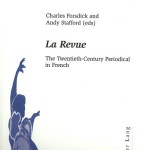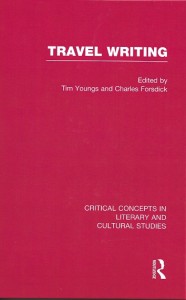 The Institute of Modern Languages Research (IMLR) continues its commitment to facilitating, initiating and promoting dialogue and research for the modern languages community but now embraces a wider remit as a centre for national research under its new name. To celebrate the launch of IMLR a conference will be held on Saturday, 7 December 2013 entitled Post-National Modern Languages. We are talking to Charles Forsdick, one of the speakers at this event. This is the second part of his interview, the first part can be found here.
The Institute of Modern Languages Research (IMLR) continues its commitment to facilitating, initiating and promoting dialogue and research for the modern languages community but now embraces a wider remit as a centre for national research under its new name. To celebrate the launch of IMLR a conference will be held on Saturday, 7 December 2013 entitled Post-National Modern Languages. We are talking to Charles Forsdick, one of the speakers at this event. This is the second part of his interview, the first part can be found here.
Charles, you will be speaking at the IMLR launch under the heading of ‘interdisciplinarity’. Could you give us a preview of what to expect from you?
Like many, I am concerned by the overuse of the term ‘interdisciplinarity’ to describe practices that are in fact cross-
disciplinary or multidisciplinary. That said, I will be talking at the IMLR launch about the status of modern languages as a field of enquiry that has always been, since its late nineteenth-century emergence, best understood as an ‘interdiscipline’. I will suggest that this characteristic should be seen not as a weakness, but as a strength. It permits a flexibility and originality of approach to questions of cultural complexity, and also gives us the tools to work actively, collaboratively and often catalytically with those in a number of other subject areas.
I am concerned that the relationship of modern languages to a number of other fields has been characterised in the past by a time lag as we endeavour to catch up theoretically, conceptually and methodologically; the responsibility of modern languages in arts, humanities and social science research is instead to take an intellectual lead, to have a leavening effect, and to ensure that the distinctiveness of languages and cultures is fully acknowledged. This depends in part on what I have mentioned already, a firm and clear sense of modern languages as an intellectual project, underpinned by clear concepts and methods, and a full commitment to a disciplinarity that we have rarely discussed in a serious and sustained way; but it also requires an active engagement with, and positive presence in other fields.
humanities and social science research is instead to take an intellectual lead, to have a leavening effect, and to ensure that the distinctiveness of languages and cultures is fully acknowledged. This depends in part on what I have mentioned already, a firm and clear sense of modern languages as an intellectual project, underpinned by clear concepts and methods, and a full commitment to a disciplinarity that we have rarely discussed in a serious and sustained way; but it also requires an active engagement with, and positive presence in other fields.
I will focus on my experience of leading an institutional theme in Liverpool, ‘changing cultures’, and more recently an AHRC theme, ‘translating cultures’, to reflect on the ways in which the interdisciplinary projects that such initiatives represent provide invaluable frames in which modern languages can redefine itself and continue to flourish.
we do not always make the connections we should with natural interlocutors in other key departments such as history, English and politics; and there is still a tendency towards a chronic extroversion
4. Is there anything else you would like to add?
The landscape of modern languages in the UK is a complicated one, often fragmented in institutional units where the persistence of old language divisions does not always allow achievement of the synergies that genuine collaboration should allow; at the same time, we do not always make the connections we should with natural interlocutors in other key departments such as history, English and politics; and there is still a tendency towards a chronic extroversion, by which I understand an exclusive focus on the cultures we are committed to studying.
I welcome the re-launch of the Institute of Modern Languages Research, and fully expect that the IMLR will be instrumental in leading the way: developing the projects, encouraging the dialogues, creating the alliances, sustaining the collaborations, training the next generation of scholars, and articulating the new public idea about language on which the success of all of these initiatives depends.
Charles Forsdick can be found on Twitter @charlesforsdick and on his blog Translating Cultures. For more information about the (re)launch of the Institute of Modern Languages Research (IMLR) check out the IMLR website or contact Dr Christopher Barenberg (e-mail: christopher.barenberg@sas.ac.uk; tel: 020 7862 8738)
